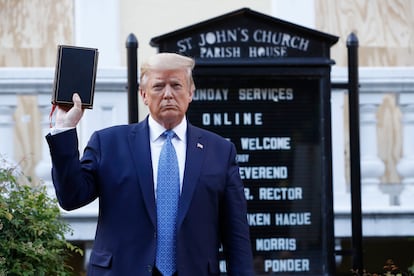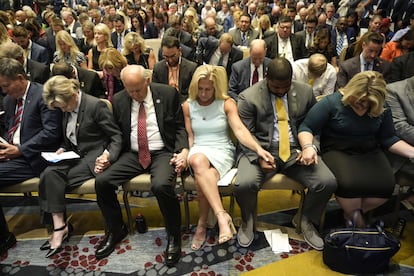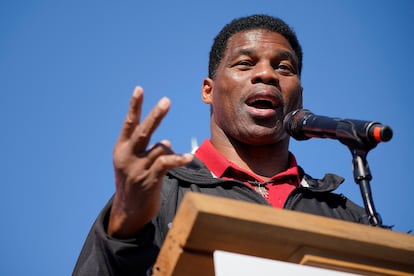Vote for me: God is on my side
Religion colors everything in American politics, from the abortion debate to the rise of far-right Christian nationalism, and it’s all on display in Georgia’s Senate race

Anthony George is the senior pastor of First Baptist Church, a Southern Baptist megachurch in a northern suburb of Atlanta (Georgia, USA) and one of the most influential Protestant churches in the United States. Just three weeks before the midterm elections, George was 30 minutes into his Sunday sermon when he launched into an impassioned critique of “transgender ideology,” calling it “physical and psychological child abuse.” He went on to attack the Black Lives Matter movement. “I don’t need those left-wing, socialist radicals telling me that Black lives matter,” he bellowed to a mostly white congregation. “If they really cared about those lives, they would stop the genocide of Black babies in the womb.” Many in the audience murmured “Amen,” and one African American man stood up to applaud.
Sunday services were already underway at Ebenezer Baptist Church, just 12 miles south of First Baptist but ideologically very distant. This church in Georgia’s capital, a key state in the upcoming legislative elections, is where Rev. Martin Luther King once preached. The pulpit at Ebenezer Baptist is now occupied by Raphael Warnock, the first African American Senator to represent Georgia. Warnock, a Democrat, is running for reelection in one of the year’s most important races, a year in which the country will elect the entire House of Representatives, one third of the Senate, the governors of 36 states, and a host of other state and local public offices. The outcome of the Georgia Senate race could determine which party controls the upper house. Warnock was not preaching that day, but instead invited Reverend Brandon Thomas Crowley, another African American Baptist pastor, to give the sermon. “I live in Massachusetts,” said Crowley, “but I am not impartial, because I have chosen a candidate, and he is the better of the two.” The congregation rose to applaud the endorsement.
Warnock is running against Republican Herschel Walker, a football legend from Georgia who has been plagued by accusations that he paid for the 2009 abortion of an unidentified woman with whom he fathered one of his four children with four different mothers. Three of these children only recently became public knowledge during Walker’s Senate campaign. The media uproar has cast doubt among Walker’s evangelical supporters about his radical anti-abortion credentials – Walker advocates a total abortion ban, even in cases of rape and incest. Warnock, the heir to the “Black liberation theology” of the civil rights movement, supports abortion rights.
The day after news of the abortion allegations broke, Pastor George hosted a planned event at his church for a group called “Prayer Warriors for Herschel.” No press was allowed in, but several participants posted videos on social media. In the videos, George likened Walker, who continues to deny the allegations, to King David, and read one of David’s psalms. “May all who gloat over my distress be put to shame and confusion; may all who exalt themselves over me be clothed with shame and disgrace” (Psalm 35, NIV). Walker told the crowd, “God has prepared me for such a time as this. Jesus is with me, and no weapon will harm me.”

The tight Senate race in Georgia – Walker is trailing Warnock by three points in recent polls – is one of the best examples of how thoroughly intertwined faith and politics are in the United States, a country that has never had a non-Christian president. But it is far from the only example. Issues such as immigration, public education and abortion have led many conservative Protestants and politicians to embrace Christian nationalism – the belief that the Christians founded the United States based on Christian principles, and that every effort must be made to defend the country against the deleterious trends of population diversity, demographic heterogeneity and the secularization of society. According to a recent study by the Pew Research Center, Christianity could cease to be the majority faith by 2070 (64% of Americans said they were Christians in 2020), when forecasts indicate that 52% of the population will be affiliated with other religions or unaffiliated. The Supreme Court’s conservative majority gave Christian nationalists fresh impetus when it overturned the Roe v. Wade decision that Americans had a constitutional right to abortion, and ruled that Maine (northeastern US) can’t exclude religious schools from a program that offers tuition for private education.
“The United States has always been a deeply religious country. What has changed is that people identify less with formal, established, historic Christian denominations,” said Paul D. Miller, a Georgetown University professor who served in Afghanistan and in the White House during the George W. Bush and Barack Obama administrations. Miller’s The Religion of American Greatness is one of the most valuable contributions to recent literature on the emergence of Christian nationalism, because it comes from someone who identifies as “a white, politically and theologically conservative American Christian,” and a lifelong worshipper at Baptist churches. “Increasingly, people on the political right identify with nondenominational, pentacostal, and charismatic movements unmoored from traditional religious authority and often expressing pretty heterodox beliefs,” Miller told EL PAÍS. “it is the final step of the Protestant Reformation. Also, people on both the right and left are using politics as a substitute religion, looking to politics as their real source of meaning, purpose, belonging, and framework of right and wrong. This isn’t secularization; it is the politicization of religion and the sacralization of politics.”
In 2016, Miller says he began to feel uncomfortable within the community he was raised in. He remained pro-life and defended family values, but did not join his new companions of the Christian right – the nationalists. Miller considers them “illiberal and dangerous,” with a tendency to drift into authoritarianism, which “is inconsistent with the ideals of the American experiment.” He interprets it as the reaction to the process that began in the 1960s, “… by which the United States was becoming more pluralistic.” This process has intensified in recent decades with “… 9/11, the two wars [in Iraq and Afghanistan], the 2008 and 2020 economic crises, the Obergefell v. Hodges Supreme Court decision [requiring all states to grant same-sex marriages], the nation’s first Black president...”
“Now that they have realized that the United States will no longer be a majority white or Christian country, they are embracing a nationalism that has been lingering since colonial times (just look at the American flags behind every pulpit). It’s a way of defending their status,” said Eric L. McDaniel, an African American professor at the University of Austin (Texas) and co-author of The Everyday Crusade: Christian Nationalism in American Politics. “Politicians stoke that vulnerability and use it to their advantage. One way to win votes is to make voters feel angry or afraid. Both feelings have a strong mobilizing power.”
An important character is this story is Donald Trump, who used unabashed nationalist rhetoric to win the White House. In January 2016, shortly before the first presidential primaries, the unlikely candidate told a receptive Iowa audience, “I could stand in the middle of Fifth Avenue and shoot somebody, and I wouldn’t lose any voters, OK?” This was the same rally where Trump proclaimed, “Christianity is under tremendous siege. We are the vast majority, but we don’t have the power we should have. Christians will have power. If I’m president, you’re going to have a lot of power. Remember that.”
And remember it they did. After some hesitation by those who doubted the New Yorker’s sudden piety, 81% of white evangelical voters voted for Trump instead of Hillary Clinton. According to the Pew Research Center, this support grew stronger while he was in office despite his penchant for cynical photo ops, like the image of Trump holding up a Bible in front of St. John’s Church in Washington, DC, the day after it was vandalized during the countrywide protests of George Floyd’s murder at the hands of a white police officer. Riot police cleared a peaceful rally so Trump could walk from the White House to the “church of the presidents,” where presidents of varying devoutness have been worshipping since 1816. Joe Biden, the nation’s second Catholic president after John F. Kennedy, regularly attends Sunday Mass at his home church in Wilmington (Delaware), where he often spends his weekends.

Christian nationalism faded for a while after the January 6 assault on the Capitol, when rioters were heard shouting, “We worship the Lord, not the government!” But not for long. Conservative candidates in the upcoming election regularly include prayer in their political rallies. In April, a local evangelical leader at a political rally in Michigan went so far as to pray, “Heavenly Father, we firmly believe that Trump is the current and true president of the United States.” Miller blames some of this on the Democratic Party. “Religious believers from across the spectrum are increasingly appalled by the political left’s radicalism and extremism, its devotion to identity politics, the phenomenon of cancel culture, the outright bigotry against religious believers in some circles and in universities, which will further support and give life to the political right.”
Marjorie Taylor Greene is up for re-election to the House of Representatives in Georgia’s District 14 (northwest of Atlanta). Nobody embodies better than her how the term “Christian nationalist” became a badge of honor. “The godless left attacks me for saying I am a proud Christian nationalist,” she tweeted recently. Two days later, she announced on Instagram the latest addition to her campaign merchandise – a T-shirt emblazoned with “Proud Christian Nationalist.”

There are others like Greene currently running for office. Doug Mastriano, Republican candidate for governor of Pennsylvania, has proclaimed a “holy war” against “the voter fraud in 2020,” allegations that have been repeatedly repudiated. And Kari Lake, the likely new governor of Arizona, seems to have suddenly discovered her faith during her campaign. They all belong to the Trumpiest wing of the Republican Party, which seems to have a firm grip on the party. Miller compares this to the way Protestant pastors have aligned with their congregations by becoming more radical, especially after the pandemic and the waves of social protests in 2020. “Many clergy told me that they feel that pressure. Americans approach church with a consumer mindset – they look for one that reflects what they already believe, and will leave a church that challenges them theologically or culturally. That’s why churches are racially segregated,” he said. “The pandemic turned out to be a big reset button. People left churches in droves-- not to leave the faith, but to find a church that fit their preferences on masks and vaccines -- and that gave them an excuse to also shop for a church that mirrored their stances on racial justice and Trump and more. I think we are in the midst of a massive political segregation within American Christianity.”

Both extremes of this political divide were on display that Sunday at the two Atlanta churches. “Warnock clearly comes from the Martin Luther King tradition,” said McDaniel, who also wrote Politics in the Pews: The Political Mobilization of Black Churches. And Walker? “White evangelicals like him because he’s clearly not going to challenge the racial hierarchy, even if it hurts him,” said McDaniel.
The mostly Black worshippers leaving Ebenezer Church after the service were reluctant to tell us whether they would vote for Warnock in November. Some alluded to old allegations of domestic violence by his ex-wife, Ouleye Ndoye, who says he ran over her foot with his car (Warnock was never charged). The dozen or so people exiting First Baptist Church who agreed to talk to us were divided into four groups: those who believe Walker’s denials of paying for an abortion; those that do believe he paid for an abortion; those who believe he did, but consider it water under the bridge; and those who say they are still undecided in light of all the ethical dilemmas that have arisen in this Senate race. The last group is similar to the evangelical voters who supported Trump in 2016 – they are inclined to shelve any doubts about their candidate’s moral failings until after they elect him to public office to represent their beliefs.
Tu suscripción se está usando en otro dispositivo
¿Quieres añadir otro usuario a tu suscripción?
Si continúas leyendo en este dispositivo, no se podrá leer en el otro.
FlechaTu suscripción se está usando en otro dispositivo y solo puedes acceder a EL PAÍS desde un dispositivo a la vez.
Si quieres compartir tu cuenta, cambia tu suscripción a la modalidad Premium, así podrás añadir otro usuario. Cada uno accederá con su propia cuenta de email, lo que os permitirá personalizar vuestra experiencia en EL PAÍS.
¿Tienes una suscripción de empresa? Accede aquí para contratar más cuentas.
En el caso de no saber quién está usando tu cuenta, te recomendamos cambiar tu contraseña aquí.
Si decides continuar compartiendo tu cuenta, este mensaje se mostrará en tu dispositivo y en el de la otra persona que está usando tu cuenta de forma indefinida, afectando a tu experiencia de lectura. Puedes consultar aquí los términos y condiciones de la suscripción digital.









































